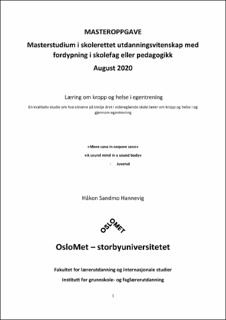| dc.contributor.advisor | Standal, Øyvind Førland | |
| dc.contributor.author | Hannevig, Håkon Sandmo | |
| dc.date.accessioned | 2021-06-14T08:21:05Z | |
| dc.date.available | 2021-06-14T08:21:05Z | |
| dc.date.issued | 2020 | |
| dc.identifier.uri | https://hdl.handle.net/11250/2759179 | |
| dc.description.abstract | Hensikt: Problemstillingen i denne studien er; “Hva lærer elever på tredje året i videregående skole om kropp og helse i og gjennom egentrening?” Her er jeg interessert i hvordan elevenes læring kommer til uttrykk både generelt i egentrening som undervisningsform, og i forbindelse med gjennomføring av treningsopplegget samt refleksjoner i etterkant. Teoretisk tilnærming: Studien benytter seg av en teoretisk tilnærming der et biomedisinsk, et alternativt og et kritiske perspektiv brukes for å identifisere hvilke temaer som kommer frem gruppeintervjuene, og undersøker deretter hvorvidt elevenes uttalelser kan forankres i disse. Til slutt diskutere elevenes synspunkter videre i lys av den teoretiske tilnærmingen. Metode: For å besvare problemstillingen har studien benyttet en kvalitativ tilnærming gjennom både deltagende observasjon og fire gruppeintervjuer med elever i VG3 fordelt på fire informantgrupper. Analysen i studien har blitt gjennomført med en temasentrert fremgangsmåte, der en modell med seks faser utgjør modellen for analysearbeidet. Funn: Studien viser at elevene erfarer at innholdet i egentreningsperioden er relatert til trening, kosthold, fysisk aktivitet og kroppens sosiale samt kulturelle betydning. Samtidig utrykker legger elevene i betydelig grad en biomedisinsk forståelse av kropp og helse til grunn, og som opererer på bakgrunn av helsismeideologien som et utgangspunkt for både innholdet og praksisen i elevenes egentrening. Konklusjon: På bakgrunn av resultatene virker det å være sentralt for elevenes læring at de utvikle en evne til kritisk refleksjon, både i sammenheng med å håndtere antagelser og diskurser relatert til kropp og helse, men også i sammenheng med at de kan utvide kompetansen i egentrening og perspektiver på kropp og helse. I tråd med teori og tidligere forskning vil jeg argumentere for en aktiv form for læringsprosess, på grunnlag av å kombinere perspektiver på kropp og helse for å skape en fysisk aktiv og læringsfremmende praksis i og gjennom egentrening i kroppsøving. | en_US |
| dc.description.abstract | Purpose: The problem in this study is; "What do third-year high school students learn about body and health in and through self-training?" Here I am interested in how the pupils' learning is expressed both in general in self-training as a form of teaching, and in connection with the implementation of the training programme as well as reflections afterwards. Theoretical approach: The study takes a theoretical approach in which a biomedical, alternative and critical perspective are used to identify the topics that emerge from the group interviews, and then examines whether students' statements can be anchored in these. Finally, discuss students' views further in light of the theoretical approach. Method: To answer the question, the study has taken a qualitative approach through both participating observation and four group interviews with pupils in VG3 divided into four informant groups. The analysis in the study has been conducted with a themed procedure, in which a six-phase model forms the model for the analysis work. Findings: The study shows that students experience that the content of the self-training period is related to exercise, diet, physical activity and the social importance of the body as well as cultural significance. At the same time, students significantly understand body and health, and operate on the basis of helsism ideology as a starting point for both the content and practice of pupils' self-training. Conclusion: Based on the results, it seems to be central to pupils' learning that they develop an ability for critical reflection, both in the context of managing assumptions and discourses related to body and health, but also in the context of expanding their competence in self-training and perspectives on body and health. In line with theory and previous research, I would argue for an active form of learning process, on the basis of combining perspectives on body and health to create a physically active and learning-enhancing practice in and through self-training in physical education. | en_US |
| dc.language.iso | nob | en_US |
| dc.publisher | OsloMet - Storbyuniversitetet | en_US |
| dc.subject | Egentrening | en_US |
| dc.subject | Kropp | en_US |
| dc.subject | Helse | en_US |
| dc.subject | Kroppsøving | en_US |
| dc.subject | Helsisme | en_US |
| dc.title | Læring om kropp og helse i egentrening: En kvalitativ studie om hva elevene på tredje året i videregående skole lærer om kropp og helse i og gjennom egentrening | en_US |
| dc.title.alternative | Learning about body and health in self-training: A qualitative study of what students in the third year of upper secondary school learn about body and health in and through self-training | en_US |
| dc.type | Master thesis | en_US |
| dc.description.version | publishedVersion | en_US |
| dc.source.pagenumber | 107 | en_US |
| dc.subject.nsi | VDP::Samfunnsvitenskap: 200::Pedagogiske fag: 280::Fagdidaktikk: 283 | en_US |
